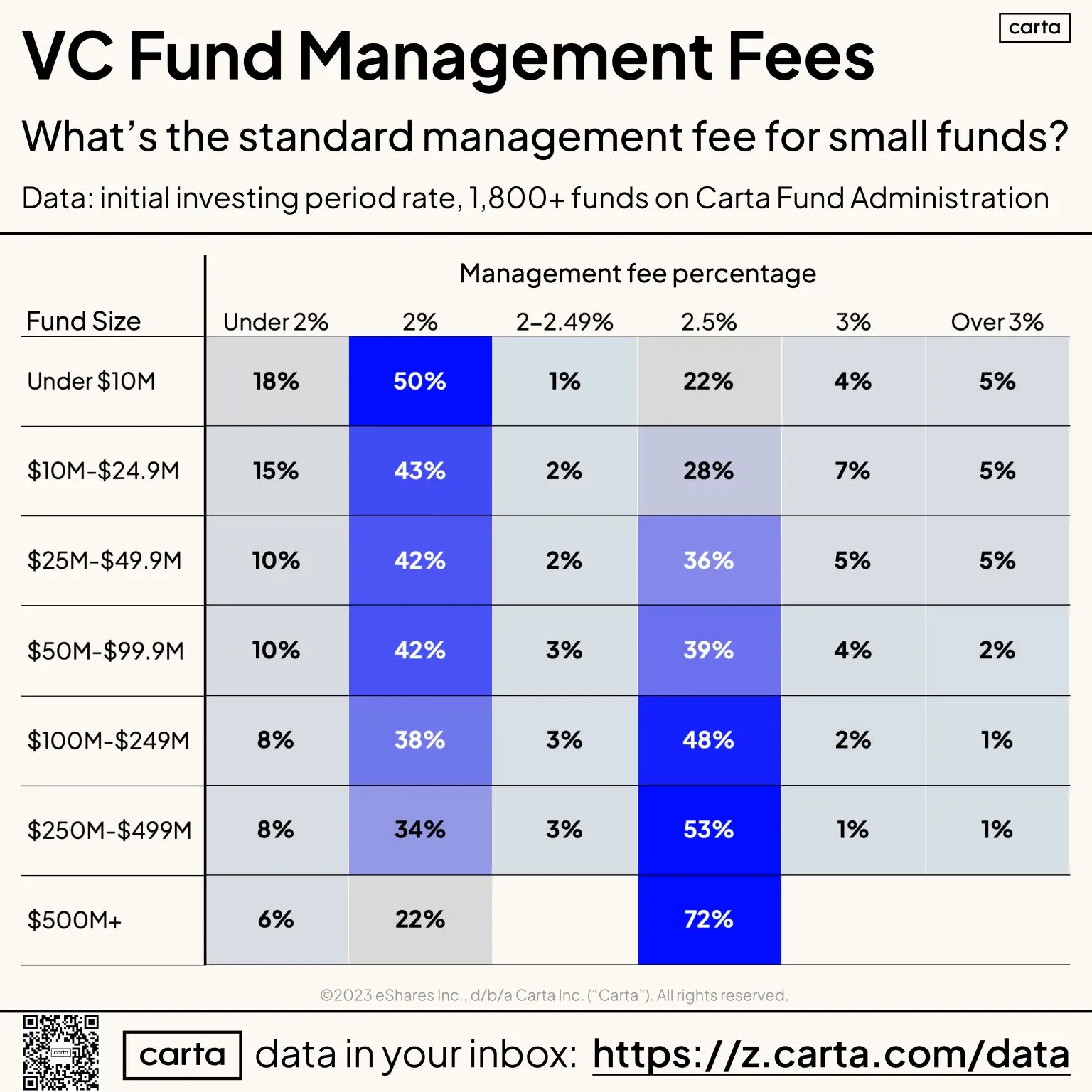Launching a venture capital (VC) firm as a new manager requires dedication, strategic planning, and a deep understanding of the industry.
This guide explores the key aspects of starting and managing a VC firm, including compensation, workload, responsibilities, clients, costs, and more.
Whether you're an aspiring fund manager or curious about the VC world, this article provides actionable insights to help you navigate the process.
How Much Do New VC Fund Managers Get Paid?
Compensation for a new VC fund manager depends on the size of the fund. For a typical Fund I, which often targets $10 million, the industry-standard 2% management fee generates approximately $200,000 per year. However, this fee isn't a personal salary, it covers all fund expenses, including legal fees, administration costs, accounting services, and team expenses.
As a result, new managers typically take a modest distribution rather than a fixed salary, keeping overhead low to maximize returns for limited partners (LPs). To optimize your VC firm's financial health, focus on efficient expense management and strategic fundraising.

How Much Work Is Involved in Launching and Running a VC Firm?
Running a VC firm is a full-time commitment, often exceeding 60 hours per week. The workload is intense, particularly in the early stages, as managers juggle fundraising, investing, and operational tasks. Time management and delegation are critical skills for balancing these demands while maintaining a high level of performance.
What Does a VC Fund Manager Do?
A VC fund manager's responsibilities evolve depending on the stage of the fund. Here's a breakdown of the key activities:
Before First Close
- 80% Fundraising: Pitching to potential LPs, building relationships, and securing capital commitments.
- 20% Everything Else: Setting up legal structures, developing investment theses, and planning operations.
After First Close
- 40% Fundraising: Continuing to secure additional capital until the fund is fully raised.
- 40% Investing: Sourcing deals, conducting due diligence, and supporting portfolio companies.
- 20% Admin, HR, Marketing, Reporting: Managing compliance, investor relations, and internal operations.
This dynamic role requires adaptability, strong decision-making, and the ability to prioritize tasks effectively.
Who Are the Clients of a VC Firm?
The limited partners (LPs) are the primary clients of a VC firm. As a fund manager, you're entrusted with managing their capital to generate returns. LPs typically include high-net-worth individuals, family offices, institutional investors (e.g., pension funds, endowments), and corporations or funds of funds.
Building trust with LPs is essential, as they rely on your expertise to deliver strong investment outcomes. Transparent communication and consistent reporting are key to maintaining strong LP relationships.
What Is the Product of a VC Firm?
The core "product" of a VC firm is access to:
- A differentiated deal pipeline
- The manager's investment judgment
- A robust network of industry connections
- Support for portfolio companies
Ultimately, the product boils down to returns generated through successful investments in startups. Your ability to identify high-potential companies and guide them to growth is what sets your firm apart in a competitive market.
How Much Does It Cost to Set Up a VC Firm?
Setting up a VC firm involves significant upfront costs, typically ranging from $50,000 to $150,000 or more, depending on factors like fund structure, legal counsel, and geographic location.
These costs cover legal fees for fund formation, compliance and regulatory filings, and administrative expenses for launch operations.
Importantly, these are one-time expenses paid by the fund (i.e., the LPs), not the manager personally. To minimize costs, work with experienced legal and compliance professionals who specialize in VC fund formation.
What Are the Ongoing Costs of Running a VC Firm?
The annual cost of running a VC firm starts at $50,000 on the lower end, excluding salaries. These expenses include fund administration fees (tax, accounting, reporting), compliance and legal costs, office space (if applicable), travel for deal sourcing and LP meetings, and software for portfolio management and investor relations.
Efficient cost management is crucial, especially for a new fund with limited resources. Prioritize tools and services that deliver the highest value to your operations and LP relationships.
Key Takeaways for Aspiring VC Fund Managers

Launching and running a VC firm as a new manager is a challenging but rewarding journey. Here are the essential points to remember:
- Compensation: Expect a modest distribution from a 2% management fee, with Fund I typically raising $10M.
- Workload: Plan for 60+ hours per week, with fundraising and investing dominating your time.
- Clients: Serve LPs like high-net-worth individuals, family offices, and institutional investors.
- Product: Deliver access to a unique pipeline and strong returns through savvy investments.
- Costs: Budget $50K–$150K+ for setup and at least $50K annually for operations.
Should You Start a VC Firm?
Yes, if you feel you have a good mix of financial acumen, operational discipline, and relationship-building skills. By understanding the compensation structure, workload, and costs involved, you can position your firm for success. Focus on delivering value to your LPs through a differentiated investment strategy and lean operations.
Check out the latest venture capital funds that have just launched.








